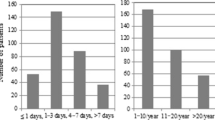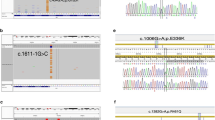Abstract
Familial Mediterranean fever (FMF) is an autosomal-recessive disease. It is characterized by recurring fever, abdominal pain, and serositis. The Mediterranean fever (MEFV) gene is localized on 16p13.3 and more than 35 mutations have been described to date. There are some differences in the gene mutations of FMF in the various ethnic groups. The aim of this study is to determine the frequency of the mutations which has been reported comparatively rare, to define the most effective mutation set, and to select the most suitable DNA analysis system for Turkish FMF patients. Mutations in 330 Turkish FMF patients with typical phenotypes from various regions of Turkey were evaluated for the research purposes. These patients were analyzed for six MEFV gene mutations by the NanoChip® Molecular Genetics Workstation. The most frequent mutation was M694V, identified in 50.00% of the alleles examined; M680I followed with 14.10% and V726A—9.70%. Consequently, we determined that R761H (n = 23; 3.48%) was the most frequent rare mutations in Turkish FMF patients. Frequency of the rare mutations were R761H (3.48%), E148Q (1.36%), and M694I (1.21%). All of these mutations were in the compound heterozygote state. Our study showed that R761H mutations were higher than it has been reported in literature until now and were mainly associated with M694V. We suggest that mutation R761H should be included in the mutation scanning analysis researches or considered if the patient has M694V/? mutation especially in Turkish FMF patients. Larger serial studies need to be done to investigate the rate and coexistence of these mutations.
Similar content being viewed by others
References
Sohar E, Gafni J, Pras M, Heller H (1967) Familial Mediterranean fever. A survey of 470 cases and review of the literature. Am J Med 43(2):227–253
Samuels J, Ozen S (2006) Familial Mediterranean fever and the other autoinflammatory syndromes: evaluation of the patient with recurrent fever. Curr Opin Rheumatol 18(1):108–117
International FMF Consortium (1997) Ancient missense mutations in a new member of the RoRet gene family are likely to cause familial Mediterranean fever. Cell 90(4):797–807
Balow JE Jr, Shelton DA, Orsborn A et al (1997) A high-resolution genetic map of the familial Mediterranean fever candidate region allows identification of haplotype-sharing among ethnic groups. Genomics 44(3):280–291
Cazeneuve C, Sarkisian T, Pecheux C et al (1999) MEFV-gene analysis in Armenian patients with familial Mediterranean fever: diagnostic value and unfavorable renal prognosis of the M694V homozygous genotype—genetic and therapeutic implications. Am J Hum Genet 65(1):88–97
Dode C, Pecheux C, Cazeneuve C et al (2000) Mutations in the MEFV gene in a large series of patients with a clinical diagnosis of familial Mediterranean fever. Am J Med Genet 92(4):241–246
The Turkish FMF Study Group (2005) Familial Mediterranean fever (FMF) in Turkey: the results of a nationwide multicenter study. Medicine (Baltimore) 84(1):1–11
Akar N, Misiroglu M, Yalcinkaya F et al (2000) MEFV mutations in Turkish patients suffering from familial Mediterranean fever. Hum Mutat 15(1):118–119
Booth DR, Gillmore JD, Lachmann HJ et al (2000) The genetic basis of autosomal dominant familial Mediterranean fever. QJM 93(4):217–221
Heller H, Sohar E, Sherf L (1958) Familial Mediterranean fever. Arch Intern Med 102:50–71
Miller SA, Dykes DD, Polesky HF (1988) A simple salting out procedure for extracting DNA from human nucleated cells. Nucleic Acids Res 16(3):1215
Moutereau S, Narwa R, Matheron C et al (2004) An improved electronic microarray-based diagnostic assay for identification of MEFV mutations. Hum Mutat 23:621–628
Gershoni-Baruch R, Shinawi M, Leah K et al (2001) Familial Mediterranean fever: prevalence, penetrance and genetic drift. Eur J Hum Genet 9:634–637
Livneh A, Langevitz P, Shinar Y et al (1999) MEFV mutation analysis in patients suffering from amyloidosis of familial Mediterranean fever. Amyloid 6:1–6
Shohat M, Magal N, Shohat T, Chen X, Dagan T, Mimouni A, Danon Y, Lotan R, Ogur G, Sirin A, Schlezinger M, Halpern GJ, Schwabe A, Kastner D, Rotter JI, Fischel-Ghodsian N (1999) Phenotype–genotype correlation in familial Mediterranean fever: evidence for an association between Met694Val and amyloidosis. Eur J Hum Genet 7:287–292
Touitou I (2001) The spectrum of familial Mediterranean fever (FMF) mutations. Eur J Hum Genet 9:473–483
Yilmaz E, Ozen S, Balci B et al (2001) Mutation frequency of familial Mediterranean fever and evidence for a high carrier rate in the Turkish population. Eur J Hum Genet 9:553–555
Ben-Chetrit E, Urieli-Shoval S, Calko S (2002) Molecular diagnosis of FMF: lessons from a study of 446 unrelated individuals. Clin Exp Rheumatol 20(Suppl 26):25–29
Majeed HA, El-Shanti H, Al-Khateeb MS, Rabaiha ZA (2002) Genotype/phenotype correlations in Arab patients with familial Mediterranean fever. Semin Arthritis Rheum 31:371–376
Cazeneuve C, Hovannesyan Z, Genevieve D et al (2003) Familial Mediterranean fever among patients from Karabakh and the diagnostic value of MEFV gene analysis in all classically affected populations. Arthritis Rheum 48(8):2324–3231
Oberkanins C, Weinhausel A, Kriegshauser G et al (2003) Genetic testing for familial Mediterranean fever in Austria by means of reverse-hybridization teststrips. Clin Chem 49(11):1948–1950
Tchernitchko D, Legendre M, Delahaye A et al (2003) Clinical evaluation of a reverse hybridization assay for the molecular detection of twelve MEFV gene mutations. Clin Chem 49(11):1942–1945
Medlej-Hashim M, Rawashdeh M, Chouery E et al (2000b) Genetic screening of fourteen mutations in Jordanian familial Mediterranean fever patients. Hum Mutat 15(4):384
Ozen S (2003) Familial Mediterranean fever: revisiting an ancient disease. Eur J Pediatr 162(7–8):449–454
Author information
Authors and Affiliations
Corresponding author
Rights and permissions
About this article
Cite this article
Demirkaya, E., Tunca, Y., Gok, F. et al. A very frequent mutation and remarkable association of R761H with M694V mutations in Turkish familial Mediterranean fever patients. Clin Rheumatol 27, 729–732 (2008). https://doi.org/10.1007/s10067-007-0780-1
Received:
Revised:
Accepted:
Published:
Issue Date:
DOI: https://doi.org/10.1007/s10067-007-0780-1




